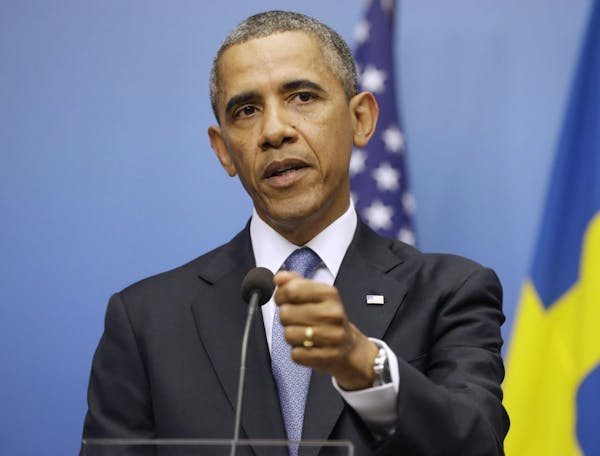WASHINGTON – President Obama's push to win congressional backing for a military strike against Syria includes White House Chief of Staff Denis McDonough, a Minnesota native who has pressed at least one recalcitrant Minnesota Democrat.
McDonough's call to U.S. Rep. Rick Nolan came Wednesday, as Minnesota Democrats found themselves deeply divided on whether to support the use of force against Syrian President Bashar Assad for his recent chemical weapons attack against his own population.
In a nod to Nolan's outspoken criticism in Congress, Secretary of State John Kerry also has invited Nolan to personally review evidence against Assad next week.
Minnesota's three congressional Republicans also have expressed ambivalence about a limited U.S. attack, with Rep. Michele Bachmann voicing the strongest opposition.
Splits among the left
But the split on the Democratic side has exposed divisions among the antiwar left, represented by Nolan, who calls an attack "folly," and U.S. Rep. Keith Ellison, who says the alleged gas attack against vulnerable men, women and children requires a military response if no alternative is available.
Nolan's call from McDonough, a fellow St. John's alumnus, came two days after the freshman congressman clashed with Kerry during an intelligence briefing on Syria. The flashpoint, according to Nolan, was his remark comparing a potential Syrian conflict with Vietnam, a war which Kerry both fought in and famously opposed.
"I said we seem to have some collective amnesia here with regard to Vietnam, Afghanistan and Iraq," said Nolan, who first served in Congress in the 1970s as an opponent of the Vietnam War.
Ellison, who is meeting with antiwar groups in the Twin Cities this week, compared Syria to other global humanitarian crises, including Darfur, Rwanda, Bosnia and Europe during World War II.
"I tell people I never claimed to be a pure pacifist," said Ellison, a former civil rights lawyer who ran for Congress as an opponent of the Iraq war. "I hate war. I'm against it almost every time. But when vulnerable populations are being slaughtered by their own government, the international community has a responsibility."
Supporting draft resolution?
Among other Minnesota Democrats in Congress, so far only Sen. Al Franken and Rep. Betty McCollum appear open to limited action against Syria. Franken said there must be "consequences" for the chemical attack. McCollum on Wednesday signed on to a draft resolution in the House that would authorize limited military action — without ground troops — for up to 60 days.
Franken and fellow Minnesota Democrat Amy Klobuchar have yet to take a public position on a similar resolution that passed 10-7 Wednesday in the Senate Foreign Affairs Committee. That resolution expands the window to 90 days with a similar ban on the use of ground troops.
The scenarios laid out for lawmakers in administration briefings so far suggest the use of cruise missile and creation of a no-fly zone, according to Nolan and Ellison.
Franken and Klobuchar said the administration's original draft resolution was too broad. With a vote now moving to the full Senate, it is unclear whether they will support the amended version passed by the Foreign Affairs Committee.
Nolan, traveling around northern Minnesota, said he was meeting with University of Minnesota Duluth Chancellor Lendley Black on Wednesday when he got a call from the White House.
Against his usual practice, he said, he interrupted the meeting and took the call. It was McDonough, a former Senate staffer who has long advised Obama on global affairs. "We had a very good and thoughtful discussion about all the ramifications, implications and evidence," Nolan said.
"They feel very confident of their position and the need to do something," Nolan recounted. "I agree with that. I just don't think the answer is another war in the Middle East we can ill afford."
The White House did not respond to requests for comment.
Nolan said nothing changed his view that a U.S. attack could escalate easily into retaliation that could later prompt a decision to deploy U.S. ground troops. Nolan said even a limited U.S. air attack could cost millions of dollars and kill "hundreds if not thousands of people."
Follow Kevin Diaz on Twitter @StribDiaz.
